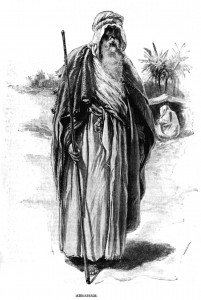Genesis 16:7–13, Hagar and Ishmael encounter Messenger of YHVH. The first place in Scripture that the term “Angel [Messenger/Malak] of YHVH is used is found in Genesis 16:7. Here Hagar flees into the wilderness with her son, Ishmael, escaping from Sarah, her mistress and is resting by a pool of water when the Heavenly Messenger/Malak of YHVH suddenly appears to her. He commands her to return to Sarah and then proceeds to pronounce a prophetic blessing upon Ishmael:
10 And the angel of YHVH said unto her, I will multiply thy seed exceedingly, that it shall not be numbered for multitude. 11 And the angel of YHVH said unto her, Behold, thou art with child, and shalt bear a son, and shalt call his name Ishmael; because YHVH hath heard thy affliction. 12 And he will be a wild man; his hand will be against every man, and every man’s hand against him; and he shall dwell in the presence of all his brethren.
What was Hagar’s response (Gen 16:13)? Christian translations of the Hebrew Scriptures (Old Testament) record that she believed that she had (incredibly) seen YHVH and lived:
So she named YHVH who had spoken with her El of Seeing, because she said, “Have I really seen the One who sees me [and stayed alive]?” (adapted from the CJB)
Then she called the name of YHVH who spoke to her, You-Are-the-God-Who-Sees; for she said, “Have I also here seen Him who sees me? (NKJV)
Then she called the name of YHVH who spoke to her, “You are a God who sees”; for she said, “Have I even remained alive here after seeing Him?” (NAS)
So she named YHVH who spoke to her, “You are El-roi”; for she said, “Have I really seen God and remained alive after seeing him?” (NRSV)
As we can see, the Christian translations give the impression that Hagar actually saw YHVH.
The ArtScroll Stone Edition Chumash (the modern Orthodox Jewish translation) translates verse 13 in this manner:
And she called the Name of HASHEM Who spoke to her “You are the God of Vision,” for she said, “Could I have seen even here after having seen?”
The Jewish Soncino Edition of the Pentateuch translates it this way:
And she called the name of the LORD that spoke unto her, Thou art a God of seeing; for she said: ‘Have I even here seen Him that sees me?’
Nineteenth-century Orthodox Jewish sage Samson Raphael Hirsch in his commentary translates this verse as follows,
And she called the name of God that spake unto her: Thou art a God of seeing; for she said: Have I then also up to here too looked after anyone who might see me? [sic]
As we can see, modern rabbinic translations of this verse are ambiguous as to whether Hagar had a vision or actually saw YHVH with her natural eyes.
The Targumim translations (Aramaic translations of the Hebrew Scriptures from the pre-Christian era made by Jewish religious officials) translate verse 13 this way,
And she gave thanks before the Lord whose Word spake to her, and thus said, Thou art He who livest and art eternal; who seest, but art not seen! for she said, For, behold, here is revealed the glory of the Shekina of the Lord after a vision. (Targum Jonathan)
And Hagar gave thanks, and prayed in the Name of the Word of the Lord, who had been manifested to her, saying, Blessed be Thou, Eloha, the Living One of all Ages, who hast looked upon my affliction. For she said, Behold, Thou art manifested also unto me, even as Thou wast manifested to Sara my mistress. (Targum Jerusalem)
And she prayed in the Name of the Lord who had spoken with her; and she said: Thou art Eloha, seeing all: for she said, I also have begun to see after that He hath been revealed to me. [14] Therefore she called the name of the well, The well at which appeared the Angel [Malak] of the Covenant. (Targum Onkelos)
These pre-Christian era Jewish translations of this passage are less obscure and ambiguous about what Hagar saw. The first says that “the Word spake to her” through his manifest Presence in a vision; the second speaks of the Word of YHVH manifesting himself to her as to Sarah; the third says that YHVH spoke to her and revealed himself to her through the Messenger [Malak] of the Covenant.
So what did the Jews believe in the pre-Christian era? Did she have a vision or see a literal Heavenly Messenger? It would appear that they were more open to the latter interpretation than are some modern, post-Christian, Jewish translations.
How do the Jewish rabbinical commentators explain this verse? Rashi, the preeminent Torah commentator of the modern era says she actually saw a messenger or an angel (Rashi: the Torah – Bereishis/Genesis, p. 159). The ArtScroll Stone Edition Chumash states that an angel or “God’s emissary” spoke to her (p. 73). Hirsch in his commentary claims that Hagar saw an angel (a Messenger or Sent One) (Genesis, p. 289). The ArtScroll Breishis/Genesis commentary also states that YHVH spoke to Hagar through an angel (p. 553).
So these commentaries unanimously agree that a literal Heavenly Messenger visited her, but upon what basis does this Messenger use the first person in pronouncing a blessing upon Ishmael? Here as in other places where the term “Angel/Malak of YHVH” is used, the Jewish sages insist that the Messenger is not YHVH and is not divine, but is only acting as an agent of YHVH and therefore is mandated by divine authority to speak in the first person, as if he were YHVH himself. As we shall see later in this work, the Jewish sages have not always had this interpretation—one which seems to have arisen during the Christian era to counteract the Christian concept of the incarnation of deity, and hence the deity of Yeshua the Messiah. (As we shall see later, the venerable Jewish Encyclopedia even admits this.) The sages of the pre-Christian era viewed this Messenger of YHVH as a manifestation of the Word or Presence of YHVH rather than as simply an angel in the common sense of the word.



